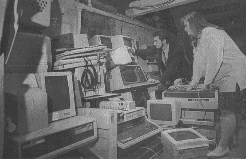
By JOANNE E. McFADDEN
Correspondent
I f you're
wondering what to do with that slow, out-dated 286 computer that
doesn't
have enough RAM, look no further. Obsolete equipment that gets tossed
onto
America's junk piles is extremely valuable to organizations in the
former
Soviet Union.
In 1993, a group of recent immigrants from Russia created the Commonwealth of Independent States Develop-ment Foundation (CISDF), a non-profit organization that seeks to "give a second life to items, which Russia needs desperately and which are no longer being used in America."
The foundation is the brainchild of Dr. Alexander Bondarev, an inventor and expert in the metallurgy field. The idea came to him one day when he was walking his dog and he came across an old television set that had been dis-carded. He took it home and found it in working condition. Bondarev realized that people in the CIS would benefit from items that no longer has any use to Americans who have upgraded their businesses with the newest equipment. As the foundation's president, Bondarev makes con-tacts with organizations, hospitals, orphanages, schools, and other groups in the CIS that would benefit from this obsolete equipment. He and his staff, which consists mainly of volunteers, have been asking corporations, indi-viduals, universities and groups in the United States to do-nate equipment to aid the people in the CIS. The CISDF received its non-profit status and all contributions are tax deductible.
Operating on the old adage: "Give a man a fish and you've fed him for a day; teach him to fish and you've fed him for a lifetime," the organization is seeking to send obsolete equipment to the CIS that will aid its people in the production of food and other goods. "The Russian people have a certain mindset people tell you what to do and you do it," explained Olga Welsh, the marketing manager of CISDF. With the collapse of the Soviet Union, Welsh said that people feel "lost - like they can't get out the rut that they're in.
Said Welsh: "We want them to change their mindset and know that they can help themselves."
While the CISDF plans to send some food and other supplies, it wants to concentrate on office, food processing and medical equipment so that the CIS countries will be able to start producing goods and providing medical care for themselves. The mission statement of the CISDF states: "Not to feed, but to aid in the creation of food. Not to clothe, but to aid in the production of clothing!"
Arefyev has joined CISDF as its vice president. When Arefyev worked for Rutgers University, he re-peatedly saw trucks overflowing with expensive, but outdated biochemical equipment to be discarded. When he asked why it was being thrown away, no one had an answer.
"When I was introduced to Dr. Bondarev, he said, 'If you really want to help your home country, help us.' I really feel that I can do something," said Arefyev.
The CISDF staff, with the help of friends, relatives, and colleagues in the CIS, are identifying organizations that will sponsor the CIS to ship donated equipment. One container costs roughly $4,500 to $5,000 to ship. Arefyev's father, who owns a newspaper in Russia, ran an article about the CISDF. The staff has dozens of letters requesting equipment.
A pediatrician and president of an organization called Help to the Newborns of Russia, cited data concluding that only 18 percent of babies born in Moscow in 1994 were healthy. He told of the lack of medical equipment such as chromatographs, fluorimeters and DNA analyzers for neonatology and perinatology units. He even said there was a lack of recent medical and scientific journals so that doc-tors could learn the latest advancements in the field.
The Moscow-based Association of Soccer for the Disabled, a charity that organizes competitions for people who have cerebral palsy, are developmentally disabled, have suffered "ecological catastrophes such as Chernobyl," and who have other disabilities, sent a two-page list of equipment they would like to have. The list includes items such as soccer uniforms, physical therapy equipment, knee pads, soccer balls, computers, office furniture and sports videos.
Items that are readily available in the United States are difficult to come by in the CIS.
"Some children in the CIS have never seen a computer, while three-year-olds here know how to use a mouse, said Welsh. Arefyev said that roughly 50 percent of some crops, such as potatoes, rot away because there is no food processing equipment to convert them into non-perishable food items.
The CISDF has an office and warehouse in South River where it is collecting equipment. Representatives in Texas, New York, Pennsylvania and California are organiz-ing similar efforts in their own states. The CISDF plans to send its first container full of equipment from Elizabeth to Moscow in mid-April. Before the equipment is shipped, a group of volunteer technicians will make any necessary re-pairs and ensure that all of the equipment is in working order. They also will make sure that the items have the proper voltage.
The container will be shipped from the port in Elizabeth to the CIS, where Bondarev's brother, Arefyev's father, and representatives from the organizations receiving the equipment will ensure that the goods do not fall into the hands of black marketeers. Arefyev's father has invited journalists and photographers to be on hand for the arrival of the shipment. Welsh said that all items will be legally documented, and photographs will be taken of people using the equipment. "We do not want anything to disappear. Our purpose is to help people, not to sell things on the black market," Welsh said.
The CISDF also seeks to foster Russian culture in the United States. Any excess funds will be used to host cul-tural events, such as a Russian poetry forum with Russian poet Eugene Evtushenko on April 7. The foundation also runs a Russian language school in New Brunswick with the aid of volunteer teachers.
* Picture: Vadim Arefyev, vice president of CIS Development Foundation, left and marketing manager Olga Welsh inventory equipment in their warehouse awaiting shipment overseas next month.
C.I.S. Development
Foundation, Inc.
77 Milltown Rd., Suite 8c, East Brunswick, NJ 08816, USA
Tel: (732) 432-7037, Fax: (732) 432-7034
E-mail: cisdf@cisdf.org
 |